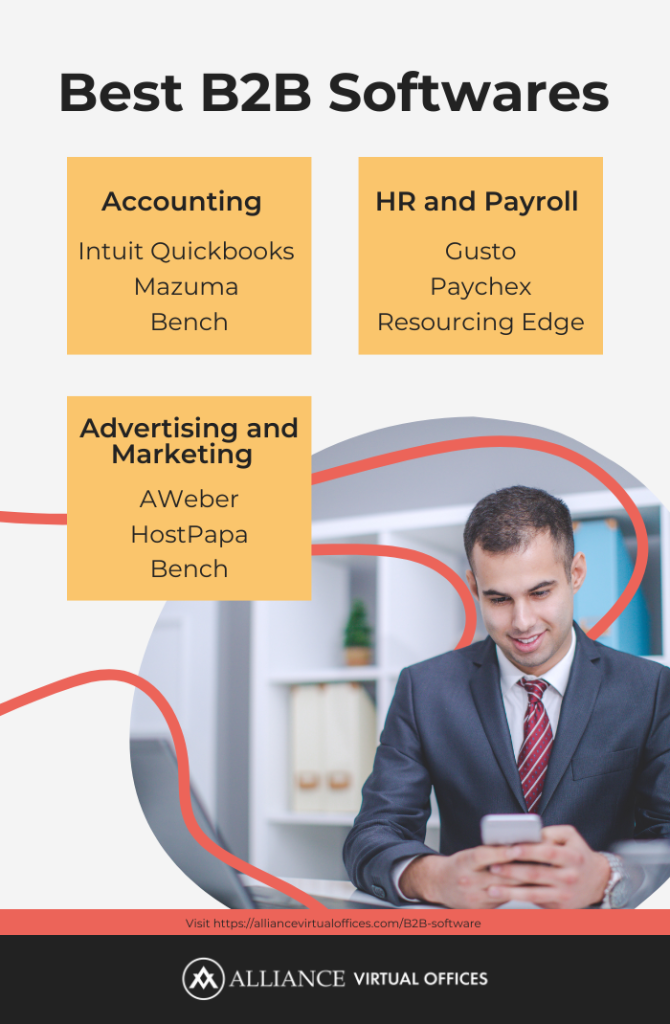- What is B2B software?
- How B2B software helps your small business save money
- The best B2B software for your small business
Q: What is the best B2B software?
A: While there is no single best B2B software, there are a number of incredibly helpful software tools that can help your B2B business thrive. This article covers how you can use B2B software to save money and grow your business. It also provides a list of the best software for accounting, advertising, and HR and payroll for your B2B business.
If you’re a business owner, you probably think of yourself primarily as a seller.
Your business is designed to move products and services, to provide customers with the things they want and need.
But one often overlooked aspect of being a business is that businesses themselves are also consumers.
While your business’s primary goal isn’t to spend money on purchases, the right purchases can help your business save money and expand.
This is true of all businesses, but it carries particular weight when it comes to B2B. The right B2B software can support business growth and help you reach and connect with future prospects.
B2B services provide tremendous value for small business owners. Case and point: RBC Capital recently predicted Amazon Business will be worth $31 billion in the next few years.
The reason for this enormous evaluation is that B2B software can launch businesses into previously unseen success. It can be your secret weapon to cut costs while still providing you with the tools you need to connect with other businesses.
But not all B2B software solutions are created equal. Making the right choice for your business is a complex, yet crucial aspect of your success.
- What are the pitfalls of B2B for small businesses?
- What is B2B software?
- How does B2B software help your small business?
- What are the best B2B software solutions?
What is B2B?
When the average person envisions a small business, they tend to imagine a standard business-to-consumer (B2C) model.
They picture a mom-and-pop flower store or a local market. These businesses sell products or services meant for consumers.
But that is only one type of business. The second type, known as business to business, sells products or services meant to serve other businesses.
When it comes to operations and offerings, B2C and B2B businesses have a few key differences.
For starters, a B2B business tends to focus more on customer retention than B2C businesses.
Consumers tend to buy various goods. For example, if a standard consumer buys a pair of pants, they are quite likely to buy a different pair the next time they need to buy pants.
Businesses are different.
When a business makes a purchase, it is often with eyes toward incorporating that purchase into standard operations.
As a result, B2B business relationships tend to be longer than the standard B2C business relationship. The long-term nature of these relationships also impacts the sales cycle.
B2C businesses tend to have short sales cycles which typically include:
- Capturing the consumer’s attention
- Convincing them that their product or service will make their life better
- Closing the deal
Comparatively, B2B businesses have much longer sales cycles. For these types of deals, businesses must:
- Capture initial interest
- Gain access to the higher-ups
- Convince numerous people of the merits of their offerings
- Position themselves as helpful to the business
- Close the deal
This can take weeks or even months, and the major difference in operations comes after close.
While customer retention is a vital aspect of any company’s operations, it’s especially important for B2B businesses.
Because of the short sales cycle for B2C businesses, a lost customer isn’t a huge issue. They can easily drum up a new prospect to replace them and continue growing.
B2B businesses can’t react as quickly. The lengthy sales cycle means that losing a customer can be a lengthier setback. It often represents a larger financial loss, and it is a loss that can linger.
With that said, why would anyone choose to stick with a B2B business?
The Benefits of B2B Businesses
B2B businesses are often much more stable after the initial launch.
Offering products or services to businesses tends to provide much more long-term predictability.
Consumers can stop making purchases on a whim. If they find a brand they like more or hit a rough patch financially, they can cut out many goods and services without much notice.
On the other hand, businesses make purchases to support their general functioning. If a business buys your B2B goods, chances are these services will be integrated into their business in an important way.
As a result, businesses are far less likely to stop making purchases abruptly. They tend to stick with products or services because, once they’ve made the decision to buy, they build their business infrastructure with those factors in mind.
In this sense, B2B’s longer sales cycle can be seen as a long-term investment. You may have to work harder to land a B2B customer, but once you do, the amount of work is reduced, balancing the equation in many respects.
B2B customers can also have a lot of cash at their disposal.
Building a business that caters to other successful businesses means you’re inherently going after a market that can afford to buy your goods or services.
Landing a big B2B customer can immediately double your business’s income under the right circumstances.
That’s why B2B is so enticing — the growth can be enormous, and landing a customer can quickly transition into predictability and stability.
What Do B2B Businesses Offer?
Many B2B businesses focus on software. Software as a service, or Saas, is one of the biggest portions of the B2B market.
B2B software companies offer other businesses ways to simplify crucial operations.
Many businesses are concerned with saving time and money. One of the easiest ways to do this is with B2B software, meaning that’s where much of the market lies.
But not everything is software-based. Some B2B businesses offer in-person or remote services.
For example, some businesses might provide outsourced accounting. They may have a staff of accountants who take on other businesses’ bookkeeping for a fee.
These businesses form a symbiotic relationship similar to that of an employee and an employer, but on a larger scale.
Businesses can also provide important goods to other businesses, such as office suppliers.
Selling pens to a business might not seem very lucrative on the surface, but when you consider the volume of pens a business orders, you can see the potential.
Add to that the fact that many businesses simply automate their orders for supplies, and it’s easy to see how B2B businesses selling the simplest of products can become profitable.
What are the Pitfalls of Running a B2B Small Businesses?
As pointed out earlier, B2B businesses have much longer, more labor-intensive sales cycles.
They have to establish contact with a business, work their way up to the key decision-maker, then convince them that the business would benefit from the purchase.
To succeed, you need to do a lot of research about the business you’re targeting.
Ask yourself these questions:
- Who is the key decision-maker?
- What are their values?
- What is their budget?
- How can you connect?
Addressing all these questions is crucial, but it adds even more work to your already busy schedule.
On top of that, losing a sale can mean lots of wasted time and energy. Each time you fail to close, you miss out on profits and have to start from square one again.
When things go well, this isn’t often the case. You’ll be able to dedicate your energy to finding the right prospects and establishing a strong pitch so you can land new business.
Unfortunately, small business owners often struggle with their B2B sales because they’re too overwhelmed with other business tasks.
Small business owners often lack the profits to hire numerous full-time employees. They have to handle many of their essential business tasks on their own.
This cuts into the time they have to focus on landing the big customers that can help their business grow and provide financial stability.
It can also leave you with a serious case of job burnout. When you’re burnt out, your productivity and effectiveness further diminish, sending you into a downward spiral.
Luckily, there are modern solutions to these problems, solutions that let you keep the huge growth potential and stability of B2B business without any of the downsides.
What is B2B Software?
B2B software is a broad category of software tools with the common goal of supporting your B2B business.
As mentioned above, software often plays a pivotal role in modern business.
Businesses integrate software into their operations to make ensure things run smoothly, increase efficiency, and reduce the amount of work placed on employees.
B2B software has proven extremely helpful to businesses of all kinds. These programs simplify many operations, making it easier for a small business with few employees to handle everything without getting overwhelmed.
Maybe that’s why B2B software sales via e-commerce are projected to reach $20.9 trillion by 2027.
Businesses who see the impact these softwares have on employee well-being, and business growth alike are poised to be a permanent and impactful facet in the future of work.
What are the Types of B2B Software?
B2B software examples range from accounting to payroll to advertising.
Ultimately, B2B software can serve nearly any function. It isn’t so much about what the software does as how it supports your specific business needs.
For small B2B business owners, sales and marketing often take up a large amount of their working time. These operations are the main drivers for B2B business growth.
Some software directly helps with those operations. Many B2B software tools provide market insights or help with content and ad creation, helping business owners reach new customers.
But B2B software can also support B2B businesses in less obvious ways.
Software that makes accounting easier or supports the HR process can also be classified as B2B software.
Because these software tools reduce the amount of time and energy a business owner needs to spend on other tasks, they indirectly support B2B sales and marketing operations.
As you can see, there are various types of softwares that fall into the B2B category. Selecting the one that is best for your business comes down to understanding what your business lacks and where you could improve your approach.
How B2B Software Helps You Save Money and Grow
B2B software helps you get more done with the same amount of people.
For instance, accounting software can cut the amount of time you spend on bookkeeping from a full work week each quarter, to a handful of hours.
This isn’t just subjectively more enjoyable. Many business owners simply can’t fit that amount of work into their already packed schedules.
Before B2B software, these business owners would have one of two options.
The first: they could hire a full-time bookkeeper or accountant.
While certainly effective, the salary for a well-trained bookkeeper can easily breach north of $100,000 per year. That’s often a large chunk of a small B2B business’s profits.
Alternatively, the business could hire an independent accountant on an as-needed basis. While certainly cheaper, this can still be quite expensive.
Even cheaper bookkeepers can charge $50 per hour.
This would be expensive enough on its own, but businesses often need more than just bookkeeping.
Depending on the size of the business, a B2B business might need four or five independent contractors or employees to handle all of the important business operations.
B2B software has changed everything though.
Instead of paying the high fees needed to outsource all these important tasks, small B2B business owners can now bring in B2B software to expedite the process.
This makes everything much more manageable, allowing business owners to tackle all the important tasks with a much smaller staff.
In turn, they save large sums of money they can reinvest into their marketing, ultimately helping them grow.
Additionally, B2B software can make your marketing even more effective.
B2B sales cycles are changing. Business decision-makers are spending far less time with reps, preferring instead to handle their business buying online.
This has thrown many B2B business owners for a loop. They’ve had to adapt their sales techniques at break-neck speed.
This can be dizzying on its own. Overhauling an approach you’ve worked on for years can be a major undertaking, requiring lots of learning and trial and error.
However, B2B marketing software can streamline the process, helping you meet your potential customers where they are and get back to closing faster.
All of this makes B2B software a fantastic investment. Adding the right software to your business can save you countless dollars while exponentially accelerating your marketing efforts.
The Best B2B Softwares
Accounting
Intuit Quickbooks
There are numerous accounting and bookkeeping softwares available on the market, but not all of them are ideally suited to your B2B business.
You need a software that empowers you, lets you understand your business’s finances, and makes the process streamlined.
Intuit Quickbooks is one of the best B2B softwares for precisely those reasons.
Quickbooks provides you with detailed reports that quickly and easily show you how your business is doing financially.
You’ll be empowered with easy-to-understand reports that provide insight into your finances, without requiring endless studying and dissecting.
Quickbooks even guides you with questions, making the accounting process simple and relevant with no extra effort on your part.
Mazuma
Another fantastic B2B software is Mazuma.
Mazuma allows you to send in your financial information online or through the mail, making it convenient and easy to enter your data.
Mazuma then compiles all your data into a group of accessible reports. These reports are delivered within a few days, granting you timely insights into your business’s finances.
When it comes time to file taxes, Mazuma simply delivers you your estimated payments, making everything about your accounting process simple and time-efficient.
Bench
Our final pick for accounting B2B software is Bench.
Bench syncs directly to your business accounts. From there, all your spending and income is compiled and returned in the form of a straightforward, helpful report.
This automation means Bench saves you as much time as possible. That time can then be reinvested in your marketing efforts, all without sacrificing your bookkeeping.
Advertising and Marketing
AWeber
Turning to marketing, AWeber is an email marketing software that makes reaching new customers simple and effective.
AWeber provides access to list-making tools, helping you compile prospects into similar categories and batch email them with appropriate hooks.
AWeber also provides sales tracking and automation, helping you stay on top of multiple prospects without getting overwhelmed.
They even provide templates to make the email creation process as quick and easy as possible.
HostPapa
Email isn’t the only important part of your online marketing though. A strong website lends credibility to incoming leads, teeing them up for future purchases.
HostPapa is one of the best choices on the market. They offer everything you need to build an outstanding website at a fraction of what you’ll pay with other hosting platforms.
Additionally, HostPapa has a plethora of self-help tools that far exceed the market standard. Even first-time website builders will find it easy to build the website of their dreams.
With plans starting below $5 per month, it’s easy to see why HostPapa is among the B2B softwares with the highest ROIs.
Webflow
If you’re looking for something a bit more advance, Webflow is a great choice.
Webflow focuses on replacing a web designer. They offer high-tech, hands-on website building that gives you control over every detail.
If you already have a bit of web design experience and want to take charge of your site layout without building a site from scratch, Webflow is the best way to do so.
HR and Payroll
Finally, we come to HR and payroll. These operations are absolutely essential to any small B2B business, but handling them yourself can eat up valuable time.
Gusto
Among the best solutions, Gusto is a relatively new B2B software that is making waves.
Gusto helps you handle payroll both for traditional employees and for independent contractors. All your payments will be standardized and streamlined, saving you time and eliminating any mistakes in your payroll procedure.
Gusto also includes onboarding and HR features that can further simplify the addition of new team members.
One of Gusto’s biggest strengths is its affordability. Basic plans start as low as $10 per month, making it a great choice for saving as much money as possible.
Paychex
Another of the market’s best offerings, Paychex also simplifies your business’s payroll.
Paychex has the advantage of automating your tax filings for your payroll, meaning you won’t have to manually add it to your books.
The higher tier options also include time tracking tools so you can pay your hourly employees with ease. Not only does this avoid error, but it promotes honesty and trust within your business.
Resourcing Edge
If you’re looking to optimize all aspects of your HR process absolutely, look no further than Resourcing Edge.
Resourcing Edge is a full professional employer organization (PEO) service that offers everything from HR conflict resolution, to safety and risk management services.
If you’re a fast-growing business, the number of HR tasks on your plate adds up fast. Resourcing Edge handles each and every aspect for you, helping you scale effectively while prioritizing what matters most: growing your business.
The Takeaway: Do You Need B2B Software?
B2B businesses have longer sales cycles, meaning they need to spend more time focused on their marketing and sales approach.
Unfortunately, the overwhelming amount of duties involved in running and growing a business can get in the way. Handling your accounting, HR, payroll, and marketing all on your own can leave you burnt out and ineffective.
Further Reading
- How to thrive as a mobile business owner who moves around a lot
- Is Your Virtual Store Missing This Critical Piece?
- Everything You Need to Know About Small Business Networking
- Startup Culture is Exploding | What Does That Mean for Your Business?
B2B software can change that though.
With various softwares that streamline every facet of your business operations, you can save money and time while becoming even more productive.
Identify the area of your business that’s eating up the most time, supplement your business with a strong software solution, and you’ll be on the fast-track to flourishing.











